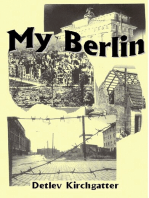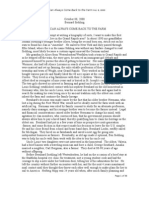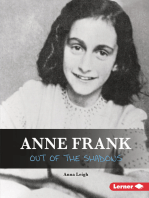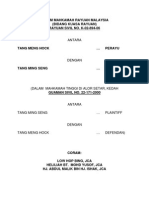Growing Up in WWII by Bernie Siehling
Growing Up in WWII by Bernie Siehling
Uploaded by
JohnCopyright:
Available Formats
Growing Up in WWII by Bernie Siehling
Growing Up in WWII by Bernie Siehling
Uploaded by
JohnCopyright
Available Formats
Share this document
Did you find this document useful?
Is this content inappropriate?
Copyright:
Available Formats
Growing Up in WWII by Bernie Siehling
Growing Up in WWII by Bernie Siehling
Uploaded by
JohnCopyright:
Available Formats
Here is my early life's story of growing up in Germany.
My hand-drawn map gives a location in the part of Germany that I often refer to as where the Rhine flows into Holland. I encountered some real problems with enlarging a normal map due to copyright restriction and resorted to a free-hand drawing with only the pertinent points of interest. Explain! As you likely know already, I was born in Grand Rapids in late 1930. My mother often referred to that year as her becoming a bride, wife, housewife, widow and mother. My father arrived in 1925 to assist and buy out his uncle on the farm in Alpine and invited my mother over in 1928. They were married in 1929 but after his tragic death in a train-car collision on 4-mile and Fruitridge she waited for my birth before returning to her parents. Luckily my father had paid a single premium on his life-insurance, so she could wrap up her affairs here and set sail with me (6month old) for her previous homeland. 1931 A series of snapshots taken by an unknown photographer in the harbor shows me in my mother's arms as the ship closes in on the pier with my grandparents waving in anticipation of welcoming their widowed daughter and first grandson who would be making their home with them for the near future. Was I spoiled? No question! In a series of visits to the old Suehling homestead in Westenborken there developed a relationship between my mother and my father's oldest brother, Hermann, the heir to the farm and they were married shortly after. So at age three I became a farm boy. I remember only good things about life on the farm, a farm with three horses, 12 cows, 40 pigs and 60 chickens and grandparents, aunts and uncles to look after me. Soon one and two brothers came along and in 1937 I started attending the same little 2-room country school my father had gone to. The little township of W-borken of 42 families had its own school with 4 grades to a room. My first grade had only 4 kids. The later history of these 4 might be of interest: one inherited his father's farm as the only son and is now deceased. The second inherited his godfather's farm in the town of Wright and now runs a dairy farm in Byron Center, MI. The third, a young lady, joined the Order of St. Boniface and spent her life in Guatemala, teaching agriculture to the Aztec Indians breaking the cycle of alternating beans and corn as their diet. She now lives in retirement in the motherhouse in Germany. And I live in Belmont. 1939 I can recall well the beginning of WW II while in 3rd grade. All kids in their wooden shoes (wooden shoes were the common footwear) had made their way to school as the teacher with tears rolling down announced: there would be no school. Go home and bring the sad news of war to your parents. There was no TV or telephone and no radios to get information. The same sad scene was repeated at
home, hard for children to comprehend, we only knew something terrible was going on (WW I ended only 21 years ago). What were the immediate effects that I can recall at that age? All young men were drafted, particularly farm-hands who knew about horses, the army still moved under horse-power, so our hired men were called in. That meant that women and children had to fill in and assume additional duties. Next, total rationing went into effect: groceries, footwear, and clothing were available only on ration cards. A total black-out was enforced. No light allowed to shine through windows or open doors, black paper covering all. Car headlights or bicycle lights only allowed for a narrow slit. Next, government inspectors counted the livestock and set rules how much meat, grain, potatoes had to be delivered to the market to feed the cities. Of course, farmers found devious methods to mislead the inspectors by shifting animals to another pasture, pigs to another sty. As children we were not to know, we might blurt out too much. In spite of more work on the farm with fewer people and additional chores for us children, life went on, with neighbor helping neighbor at peak times. A big disadvantage was the fact that Papa Hermann was a WWI veteran, who at age 19, his first day at the front lost his right leg to shrapnel from a grenade exploding above the tenting area and was not suited to many farm tasks. The solution came in form of Polish POWs who were assigned to help out. They lived in a nearby camp, arrived in the morning and returned at night with armed guards. That soon changed when they were allowed to live with us and before long became members of our family. We learned to talk to them and as children will do: we picked up their favorite swear words. They then scolded us for using them without knowing what we were saying. In time they were exchanged for French, Yugoslav, Russian and Belgian POWs and the normal process with cuss words repeated itself. I remember a French prisoner, 20year old Marcel, crying like a child when he was transferred to a different assignment. The Belgians could have walked home, they were so close, however did not dare for the consequences. After the war I wrote to them in French, they even brought a busload of family for a visit. 1940 The main event of that year took place on 10 May when the German campaign against France began and by disregarding the neutrality of Holland Belgium the Wehrmacht circumvented the Maginot Line. Until then one could see an occasional plane in the sky, but that morning an armada of Stukas, Messerschmidt fighters was overhead, and we knew something big was up. As a child I was anxious to read every word of the two-page newspaper, but in other ways life on the farm went on as it always had with plowing, seeding, weeding, harvesting, and my school required 6 hours a day, 6 days a week. At the end of 1940, ten years old, I was sent to high school in Borken. I was given a bicycle and now wore leather shoes. I was not keen
about it, I fully expected to be heir to the farm, but was not the oldest of the oldest son. English was my first foreign language, in 2 year intervals followed by Latin and French, plus the sciences math, chemistry and physics plus history, geography and biology. And yes, instruction in religion all through the war years in spite of the common anti-religious attitude of the regime. Coming home from school in the early afternoon, I always needed to check what chores were waiting for me on the farm, or whether Papa already had a certain job in mind. Homework could wait till after dark. 1941 The war grew more intense. For a long time Hitler could only be successful or so it seemed, listening to propaganda broadcasts by Minister Goebbels. Our new radio, a Volksempfaenger, tuned to a single station, was bringing reports of operations always preceded by martial music. In the fall I was to visit my grandmother. The grandparents on the farm had died already. How did a 10year old cover the 50 miles of travel: my mother pedaled me and my satchel to the train station in Borken and instructed the train conductor with the details, and to keep an eye on this youngster. At the end of the 1-hour ride the conductor pointed me to the bus in front of the station and, lo and behold, the driver knew I was coming and held in his hand the ticket my grandma bought with instructions to look for her grandson. After passing through a few villages I saw her waiting for me and thanked the driver for his diligence. Only a few days later an urgent message arrived: come home right away. Borken was bombed! A British bomber dropped a so-called air mine into the residential center of town, collapsing a whole city block. The bomb exploded above the rooftops and caused many deaths. Rumors talked about carelessness of the blackout, allowing the accuracy of the hit. War had come to sleepy Borken and gradually more and more British planes began to use the nightly raids to cause damage to the Ruhr valley industrial areas 20 miles to the south. While farm country was still the safest place to be, since this area had no military targets like airports or factories, it was only lightly defended by fighters or AAA and therefore was used as a relatively secure route to fly to targets further inland. Returning bombers often dropped their loads haphazardly. They might have missed their intended targets or did not want to carry the dangerous explosives home. Such was the reasoning, when six bombs fell at night in our neighbor's farmyard, that blew every tile off the roof of his buildings. Two of the bombs were unexploded duds and army personnel tried to defuse them. As they dug their way down they accidentally triggered the explosion and were killed. Two of our close neighbors then got together with us and we built an earthen
bunker on a patch of high ground to avoid ground water, for protection during nights of heavy air activity. A hole was dug, the sides braced with heavy timbers, the same over the top, with a 3-foot layer of dirt. The inside had wooden benches covered with dry straw allowing the children to doze on, sometimes for a good part of the night. The entrance was a zig-zag trench and the adults watched the action in the night sky and observed planes getting caught by the searchlight fingers causing an AA barrage, often ending in a fiery crash. Explosive noises and Flak fire could be heard from a 20mile distance. Incendiary devices were of major concern, a farm, upon being hit would be ablaze in minutes and efforts to douse the fire were met by more explosives, all normally between the hours of 11pm to 3am. 1942 No Germans could understand Hitler turning on Russia, and his plan of a 6week campaign faltered. The German army was not prepared for winter fighting and I remember a drive to collect woolen clothing for the troops. When Stalingrad happened, all saw the disaster building up, but nobody spoke up. Final victory was the word from Berlin. Supplies dried up in spite of rationing. My socks showed large holes, too big to darn. An orphan lamb had been given to us by a sheepherder; we kids raised it on a bottle and sheared the wool next year. Several steps are needed from sheep wool to socks. I volunteered to spin the wool and mastered the craft. Somebody was found to knit the socks. Woolen socks are scratchy but warm. Here a sample of my know-how from many years ago a scarf! Old suits and dresses were reworked to fit the younger generation. Wooden shoe production was booming. There was a big problem with the German currency. It had become useless. Money was now secondary. Barter was the order of the day. My mother never went to town without sturdy bags on the handlebars of her bicycle, full of eggs, padded in chopped straw, that she managed to trade for cloths or other items. The sows we slaughtered on the farm were never fat enough to suit my mother, because for a slab of bacon or a jar of lard she could find somebody willing to trade for what she was looking for. It took a lot of networking! Farmers also remembered old crafts: how to make soap, a drawn out process, how to boil sugar beet syrup similar to maple syrup. It was the kids favorite afternoon snack on Pumpernickel bread. Small animals like ducks, geese, turkey, rabbits were raised to enhance the meat supply for a family of ten. Many a weekend my mom said: Bernie, can you find a rooster for a Sunday meal? At a young age I saw many animals slaughtered and I knew what to do. The number of sheep had multiplied and the mutton is tasty meat. It was my duty! Papa was too handicapped, these were tough times and allowances had to be made to feed the family. The war was going awry and the handwriting on the wall, yet nobody dared utter any negative remarks, the Gestapo was waiting with swift actions.
1943 More war activity and ever closer to home threatened our lives daily. On May 16, 1943 at midnight I heard the sound of plane engines at low level looking out the bedroom window. One, two, three planes went by, visible in the bright moonlight. The last one caused a massive flash, the engines died. A small fire started and grew, onboard ammo exploded, ten minutes after the crash a giant detonation rocked the neighborhood, and then all was quiet. Early on in the next morning we youngsters went to the nearby crash site and saw the plane had hit a steel power pole and sheared the tops of tall poplars. This attack by 19 planes became known as Operation Chastise and can be studied in detail on the web (Dam Busters). I was invited to Hamilton, Ontario, Canada on the 60th anniversary, several of the dead fliers were from that city and I could give an eyewitness report, as I did to a BBC reporter this past May, seventy years later. The operation was fully expected to end WW II by interrupting power to armament production, when in fact it cost 8 Lancasters and 56 crew members. In spite of the breach of 2 dams causing 1200 drownings mostly conscript laborers, other damage was minimal and repaired within weeks. Only 5 weeks later an American B 17 on a day time bombing run on chemical works 20 miles to the south was shot up and belly-landed in our immediate neighborhood with 2 engines missing out of 4 and only one still running. The plane's and the crew's fate became the basis of this booklet: History of a Propeller, supported by the pilot's Paul Kahl's biography Cotton picking Pioneer. I last talked to him on his 95th birthday three months ago in NSW AU. All details were collected by my brother in Germany, I did the translation. In summary: Both the plane's props were dismantled by local guard crews, the first melted in for the metal, the second buried in the field, only to be rediscovered long after war's end, and is now serving as a museum center piece. Details would require an additional web page. 1944 The Allies succeeded in Normandy, the Russians advanced in the east. All knew the war was lost, just a matter of time. Still, Goebbels talked final victory and new weapons. Market Garden 40 miles to our west, resounded with battle noises from the cities of Arnheim and Nymwegen (see map). Allied forces assembled west of the Rhine River in preparation for operation Varsity known for the massive use of gliders towed from England to ferry troops and equipment to the eastern river bank. The German offensive known as Battle of the Bulge had sputtered for lack of fuel and equipment. I recall an American bomber unit of 25 planes overhead as I was working a field with my team a quarter mile to the north. American air forces had taken over all
day time raids. The unit made a right turn above our house and I heard the rumble of falling bombs, a very distinct noise in a carpet bombing exercise. I feared the worst. The first craters 250 ft. south of our house and then 20 to 30 through the country side. A young man my age was in the field with his horses, all were killed. No reason behind the bombing in the open country was ever learned. In visits with my children or grandchildren I can still show them a crater in a patch of our woodland that dates back to this raid and has not been filled in. 1945 The Rhine crossing was planned for March 1945 by American, British and Canadian troops. Two days ahead leaflets warned the people of Borken of an air attack and all left town. At 10am 3 squadrons of 4-engine planes showed up to turn the 700 year old town into rubble, easily seen from 1 miles away. The burning church steeple could be seen tipping over. We knew the invasion was on. An advance group of paratroopers was dropped to clear the ground for 1300 gliders to ferry the infantry across the Rhine. Life magazine of 9 April 1945 caught the event in a series of battle field photos 10 miles to the west of our house. Within 24 hours our farm was now the front line, as allied tanks positioned themselves, their guns pointing east. My mother's and my English was basic and the front line GIs were not to fraternize, but could ask for eggs and water. They were not hostile in any way, did no further damage and moved on shortly. I found out later: a young Jewish soldier, who fled Borken in 1938, was part of the American contingent and stopped by to see his parents' house intact. I also found out that the commanding officer was Gen. M. Ridgeway, my immediate superior 8 years later in Korea. The following happened to me 5 years ago: I shared with the EGR J.C.s my Varsity story, and at Q&A a member stated, he could vouch for my words, he was on the ground that first day as a paratrooper and named villages he passed. Simply a number of circles coming full term! If time allowed I could spell out many more connections of years ago. I struck up many acquaintances over the years making direct connections too numerous to report at this time. Ask me sometime, because it is amazing how former enemies will turn into friends with the passage of time.
You might also like
- Example Wedding SpeechDocument38 pagesExample Wedding SpeechToby HendersonNo ratings yet
- The Image and The Witness: Trauma, Memory and Visual CultureDocument288 pagesThe Image and The Witness: Trauma, Memory and Visual Cultureleif_eriksson_89No ratings yet
- U.S. Bank OED Web Installation User Guide v2.0 - 0710Document12 pagesU.S. Bank OED Web Installation User Guide v2.0 - 0710Joseph Yoshiaki HirotsuNo ratings yet
- Jean-Paul Sartre - The Case For Responsible LiteratureDocument6 pagesJean-Paul Sartre - The Case For Responsible LiteratureMiodrag MijatovicNo ratings yet
- Off The Road - The Journey BeginsDocument76 pagesOff The Road - The Journey BeginsConrad SmitNo ratings yet
- Ann Kuebler Breen StoryDocument4 pagesAnn Kuebler Breen Storykbreenbo1No ratings yet
- Childhood Memories of Havant in The Second World WarDocument96 pagesChildhood Memories of Havant in The Second World WarRalph CousinsNo ratings yet
- Born On The Wrong Side of The FenceDocument53 pagesBorn On The Wrong Side of The FenceGraham Moore100% (1)
- A Berliner's Luck: Surviving the Third Reich and World War IiFrom EverandA Berliner's Luck: Surviving the Third Reich and World War IiNo ratings yet
- The Two Sisters: The Story of Ettie Wood and Annie McKenzie, Wife of “Fighting Mac”From EverandThe Two Sisters: The Story of Ettie Wood and Annie McKenzie, Wife of “Fighting Mac”No ratings yet
- An Alien Sky: The Story of One Man's Remarkable Adventure in Bomber Command During the Second World WarFrom EverandAn Alien Sky: The Story of One Man's Remarkable Adventure in Bomber Command During the Second World WarNo ratings yet
- Harpenden Childhood Remembered: Growing Up in the 1940s & 50sFrom EverandHarpenden Childhood Remembered: Growing Up in the 1940s & 50sNo ratings yet
- How Britain Kept Calm and Carried On: True stories from the Home FrontFrom EverandHow Britain Kept Calm and Carried On: True stories from the Home FrontRating: 4 out of 5 stars4/5 (2)
- Short's Stories: Bomb Dropping, Hampstead, North London 1940-1949From EverandShort's Stories: Bomb Dropping, Hampstead, North London 1940-1949No ratings yet
- Of No Interest to the Nation: A Jewish Family in France, 1925-1945From EverandOf No Interest to the Nation: A Jewish Family in France, 1925-1945No ratings yet
- Thursday Afternoon Nash ObookoDocument374 pagesThursday Afternoon Nash ObookoRobert SomhegyiNo ratings yet
- Looking Back: Reflections of a London Child on the War Years 1939 - 1945From EverandLooking Back: Reflections of a London Child on the War Years 1939 - 1945No ratings yet
- ANSWER KEY To Anne Frank Study Guide Part IDocument4 pagesANSWER KEY To Anne Frank Study Guide Part ICurlyhead.kaylee TNo ratings yet
- A 1940s Childhood: From Bomb Sites to Children's HourFrom EverandA 1940s Childhood: From Bomb Sites to Children's HourRating: 2.5 out of 5 stars2.5/5 (1)
- Overture and Beginners Please: An Autobiography in Five MovementsFrom EverandOverture and Beginners Please: An Autobiography in Five MovementsNo ratings yet
- Who Is Paule ObookoDocument189 pagesWho Is Paule ObookoPsalm Albert OluwatobilobaNo ratings yet
- You Can Always Come Back To The FarmDocument36 pagesYou Can Always Come Back To The FarmJohn100% (1)
- Anne Frank's StoryDocument32 pagesAnne Frank's StoryAndy SherwinNo ratings yet
- Echoes of The PastDocument26 pagesEchoes of The PastATZUMNo ratings yet
- The War and the Death of News: Reflections of a Grade B ReporterFrom EverandThe War and the Death of News: Reflections of a Grade B ReporterRating: 4 out of 5 stars4/5 (1)
- Tell your children about us: The Dutch in Wartime, Survivors RememberFrom EverandTell your children about us: The Dutch in Wartime, Survivors RememberRating: 4 out of 5 stars4/5 (1)
- Luftwaffe Fighter Pilot: Defending the Reich Against the RAF and the USAAFFrom EverandLuftwaffe Fighter Pilot: Defending the Reich Against the RAF and the USAAFRating: 4 out of 5 stars4/5 (1)
- My Life in GermanyDocument5 pagesMy Life in Germanyharini05052008No ratings yet
- One Step Ahead Alfred Philip Feldman Full ChapterDocument67 pagesOne Step Ahead Alfred Philip Feldman Full Chapterpaul.schmidt216100% (8)
- Paradise with Black Spots and Bruises: Stories, Pictures, and Thoughts of a LifetimeFrom EverandParadise with Black Spots and Bruises: Stories, Pictures, and Thoughts of a LifetimeNo ratings yet
- In The Shadow of Death by Kritzinger, P. H.Document106 pagesIn The Shadow of Death by Kritzinger, P. H.Gutenberg.orgNo ratings yet
- People vs. MartinadaDocument6 pagesPeople vs. MartinadaIan ManglicmotNo ratings yet
- Nomination FormDocument2 pagesNomination FormRohan ShejwalkarNo ratings yet
- Temecula Valley Unified School District Board Meeting Item On Social Studies CurriculumDocument2 pagesTemecula Valley Unified School District Board Meeting Item On Social Studies CurriculumThe Press-Enterprise / pressenterprise.comNo ratings yet
- The Spanish American WarDocument98 pagesThe Spanish American WarVeinna Yein Abansado AdaroNo ratings yet
- Rayuan Sivil No K-02-894-06 Tang Meng Hock V Tang Ming SengDocument12 pagesRayuan Sivil No K-02-894-06 Tang Meng Hock V Tang Ming SengSyarah Syazwan Satury0% (1)
- Songbook: E-MailDocument25 pagesSongbook: E-Mailkarol_surovy0% (1)
- Linux CmdsDocument18 pagesLinux CmdsZeyRoX GamingNo ratings yet
- Soal Les Ulangan Bahsa Inggris Kelas 2 Sem 2222Document3 pagesSoal Les Ulangan Bahsa Inggris Kelas 2 Sem 2222smp n1No ratings yet
- CurriculumDocument15 pagesCurriculumSanjeevNo ratings yet
- Q400.WM (73) .WM25 21 00 1Document8 pagesQ400.WM (73) .WM25 21 00 1Brian Matu PessieNo ratings yet
- BWV76 - Die Himmel Erzählen Die Ehre GottesDocument42 pagesBWV76 - Die Himmel Erzählen Die Ehre GottesLegalSheetsNo ratings yet
- Metropolitan Bank Vs CabilzoDocument1 pageMetropolitan Bank Vs CabilzoMariet Maceda100% (1)
- IBF NotesDocument35 pagesIBF NotesAsad Shah100% (1)
- Practice Test 2Document9 pagesPractice Test 2Lê Hà LinhNo ratings yet
- Pelumi Chapter 1 - 5Document46 pagesPelumi Chapter 1 - 5Amusa Yakxub100% (2)
- What Is A Cover Letter For An EssayDocument8 pagesWhat Is A Cover Letter For An Essayafaydebwo100% (2)
- Ia 2 Ppe She 1Document22 pagesIa 2 Ppe She 1AlisonNo ratings yet
- US Vs Javier, G.R. No. L-12990Document2 pagesUS Vs Javier, G.R. No. L-12990JNo ratings yet
- Production Weekly - Issue 1117 - Thursday, November 1, 2018 / 185 Listings - 39 PagesDocument1 pageProduction Weekly - Issue 1117 - Thursday, November 1, 2018 / 185 Listings - 39 PagesProduction WeeklyNo ratings yet
- Crim Cases Digested by One and OnlyDocument20 pagesCrim Cases Digested by One and OnlyPrince Dkalm PolishedNo ratings yet
- Relevance of Entrepreneurship To An OrganizationDocument2 pagesRelevance of Entrepreneurship To An OrganizationHannah Menchie Abulon50% (2)
- Grade 6 MathsDocument47 pagesGrade 6 MathsPatrick Ian BernardNo ratings yet
- Statutory Construction - The Art or Process of Discovering and Expounding The MeaningDocument20 pagesStatutory Construction - The Art or Process of Discovering and Expounding The MeaningTendido TendoNo ratings yet
- Works of Daniel BurnhamDocument27 pagesWorks of Daniel BurnhamStrielamia AlmazanNo ratings yet
- Approximate Digital They Imagery (Refer Chapter 10), ImageDocument5 pagesApproximate Digital They Imagery (Refer Chapter 10), ImageNarasimhareddy MmkNo ratings yet
- Financial Analysis Using Financial Performance Metrics-Fitri-IsmiyantiDocument26 pagesFinancial Analysis Using Financial Performance Metrics-Fitri-Ismiyantiputri shanahNo ratings yet

























































































